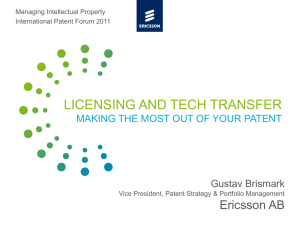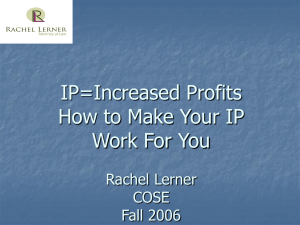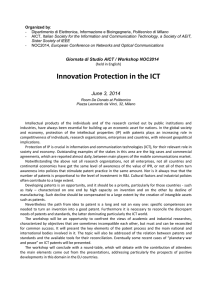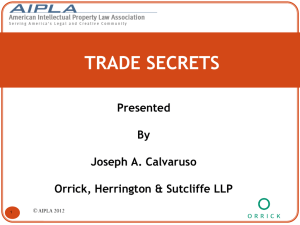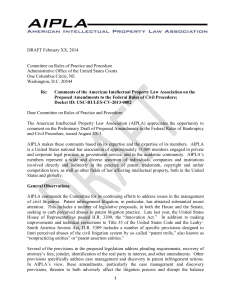2016.01.06 - AIPLA Comments on KFTC Amended IP Guidelines
advertisement
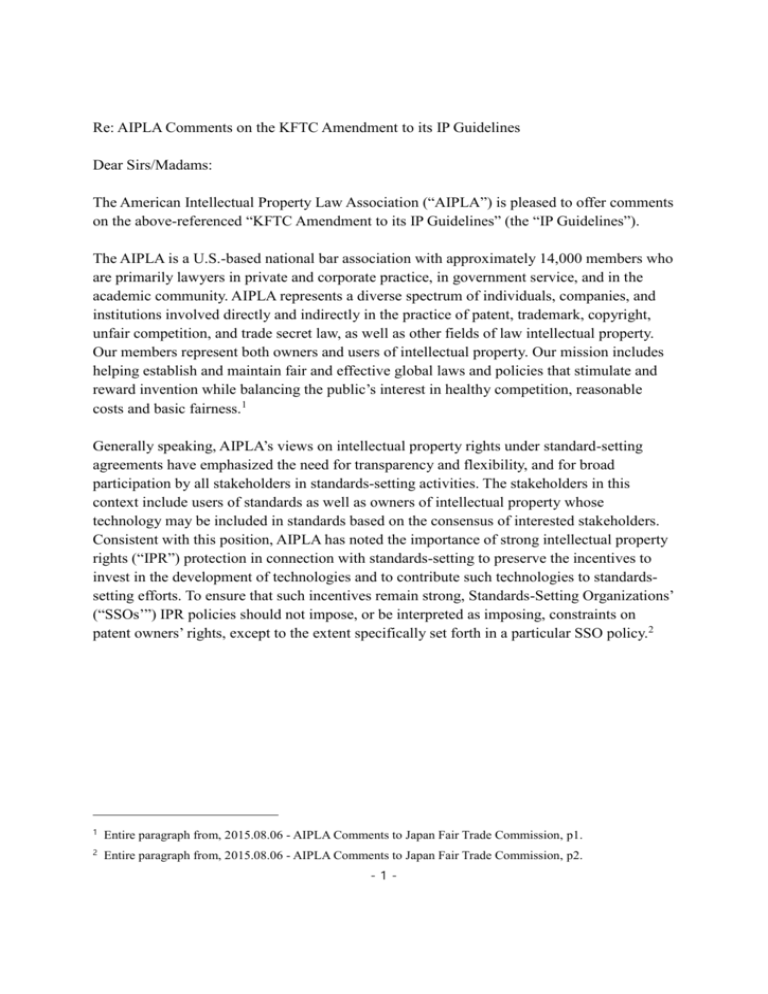
Re: AIPLA Comments on the KFTC Amendment to its IP Guidelines Dear Sirs/Madams: The American Intellectual Property Law Association (“AIPLA”) is pleased to offer comments on the above-referenced “KFTC Amendment to its IP Guidelines” (the “IP Guidelines”). The AIPLA is a U.S.-based national bar association with approximately 14,000 members who are primarily lawyers in private and corporate practice, in government service, and in the academic community. AIPLA represents a diverse spectrum of individuals, companies, and institutions involved directly and indirectly in the practice of patent, trademark, copyright, unfair competition, and trade secret law, as well as other fields of law intellectual property. Our members represent both owners and users of intellectual property. Our mission includes helping establish and maintain fair and effective global laws and policies that stimulate and reward invention while balancing the public’s interest in healthy competition, reasonable costs and basic fairness.1 Generally speaking, AIPLA’s views on intellectual property rights under standard-setting agreements have emphasized the need for transparency and flexibility, and for broad participation by all stakeholders in standards-setting activities. The stakeholders in this context include users of standards as well as owners of intellectual property whose technology may be included in standards based on the consensus of interested stakeholders. Consistent with this position, AIPLA has noted the importance of strong intellectual property rights (“IPR”) protection in connection with standards-setting to preserve the incentives to invest in the development of technologies and to contribute such technologies to standardssetting efforts. To ensure that such incentives remain strong, Standards-Setting Organizations’ (“SSOs’”) IPR policies should not impose, or be interpreted as imposing, constraints on patent owners’ rights, except to the extent specifically set forth in a particular SSO policy.2 1 2 Entire paragraph from, 2015.08.06 - AIPLA Comments to Japan Fair Trade Commission, p1. Entire paragraph from, 2015.08.06 - AIPLA Comments to Japan Fair Trade Commission, p2. -1- Current Guidelines Proposed Amendment AIPLA COMMENTS Review Guidelines on Unfair Exercise of Intellectual Property Rights ------------------------------------------------------ [No Comment] --------------------------------- Korea Fair Trade Commission’s established rules No. 205 Korea Fair Trade Commission’s established rules No. OOO I. General Provision 1. Purpose The purpose of these Guidelines is to enhance the consistency and predictability of law enforcement and promote fair trade practices by providing general principles and specific criteria for review in applying the Monopoly Regulations and Fair Trade Act (hereinafter referred to as the "Act") to the exercise of intellectual property rights. I. General Provision 1. Purpose The purpose of these Guidelines is to enhance the consistency and predictability of law enforcement and promote free and fair competition by providing general principles and specific criteria for review in applying the Monopoly Regulations and Fair Trade Act (hereinafter referred to as the "Act") to the exercise of intellectual property rights. AIPLA is mindful of the important balance between competition and IP laws, each having a role in promoting innovation and competition.3 The proposed amendment to the Guidelines concern patents that are essential to a technical standard developed by standard development bodies, which are often called standard essential patents (SEPs). Most standards development bodies recognize a fundamental balance of interests between those of innovators who own standard essential patents and invest in risky technology development for emerging standards, as well as the interests of those seeking to adopt the standards and make use of such innovative technologies through licenses.4 It requires consideration of two equally 3 4 2015.10.14 - AIPLA Response to NDRC Questionnaire on IP Misuse, p2. (modified for context). 2015.08.06 - AIPLA Comments to Japan Fair Trade Commission, p2. -2- Current Guidelines Proposed Amendment AIPLA COMMENTS important goals: (1) providing adequate compensation to the developers and contributors of technology through the licensing of standard essential patents on fair, reasonable, non-discriminatory terms; and (2) ensuring reasonable access to the technology for implementers who want to produce and sell standard compliant products. Ensuring that the first goal is considered incentivizes the continued investment in standardized technologies, which can be difficult and risky to develop.5 AIPLA thus supports the amendment to the extent that the addition of the term “free … competition” means free from unnecessary government intervention. AIPLA does not support the amendment to the extent that the term “free competition” may be misconstrued to mean free from any encumbrance and, thus, may threaten to diminish the obligation to fairly compensate patent owners. 3. Definitions A. In these Guidelines, the following terms shall have the following meanings: 5 3. Definitions The proposed amendment would delete the last ------------------------------------------------------ phrase of the definition of “Standard ------------------------------------------------------ Technologies” that would include Entire paragraph from, 2015.08.06 - AIPLA Comments to Japan Fair Trade Commission, p2. -3- Current Guidelines Proposed Amendment AIPLA COMMENTS (1) ~ (4) [omitted] (5) “Standard Technologies" mean technologies designated by government, standardization bodies, enterprisers organizations, a group of enterprises possessing technology of the same type, etc. as standard technology in specific technology areas, or technologies actually used widely as the standard in the relevant technology area. ---------------------------------(5) “Standard Technologies" mean technologies designated by government, standardization bodies, enterprisers organizations, a group of enterprises possessing technology of the same type, etc. as standard technology in specific technology areas. “technologies actually used widely as the standard in the relevant technology areas.” AIPLA agrees with KFTC’s removing that concept of de facto standards in the definition of “Standard Technologies.” (6) “Standard Essential Patents” are the patents used to implement standard technologies, and a party needs to acquire a license of the patents when the party produces products or provides services in need of the standard technologies claimed by the patents. (6) “Standard Essential Patents” are patents that are essential to produce products or provide services that implement standard technologies, and that the patent holder has been required to make a commitment to license on Fair Reasonable And NonDiscriminatory (FRAND) terms. AIPLA appreciates KFTC’s attempt to clarify the definition of “Standard Essential Patents.” AIPLA suggests that the proposed amendment be revised to change the statement about “patents that are essential” to a statement about “patents that are technically essential.” This is a well-developed concept to specify that it is not possible to manufacture products that comply with a standard without using such patents. AIPLA suggests that the proposed amendment be revised to change the statement that the patent holder “has been required to make” a FRAND commitment to a statement that the patent holder “has made” a voluntary FRAND commitment. It is not a common practice or -4- Current Guidelines Proposed Amendment AIPLA COMMENTS clear if and when a patent holder “has been required” to make a FRAND commitment. The relevant, common practice with clearer demarcation is when a patent holder “has made” a FRAND commitment. Participants in a standard development organization (SDO) often take different types of voluntary actions with the SDO, such as (1) agreeing to disclose to the SDO patents that they own that may be relevant to a standard being developed or (2) the separate, different action of stating whether and to what extent the patent owner is willing to license its patents that are essential to the standard, such as a FRAND commitment. The timing and form of such voluntary actions vary among the different SDOs based on their intellectual property rights (IPR) policies—e.g., some may require agreement to undertake certain voluntary actions (e.g., agreement to disclose relevant patents or a FRAND commitment) at the time the patent holder agrees to participate in the SDO; but other SDOs may seek such commitments from participants on a case-bycase basis during the course of developing a specific standard. Further, rules regarding IPR licensing -5- Current Guidelines Proposed Amendment AIPLA COMMENTS commitments typically refer to situations in which an IPR owner declares its willingness to offer a license or undertakes a commitment to license particular IPR to implementers of the standard on certain terms and conditions, typically reasonable and non-discriminatory (RAND).6 If an IPR holder has made a FRAND commitment, then it has agreed to license its SEPs subject to that commitment on nondiscriminatory terms. A FRAND commitment, however, does not necessarily mean that all licensees must be offered the same terms. In general, this means only that similarly-situated licensees should be offered economically similar terms. There may be significant differences between license agreements reached based on the particular facts and circumstances, and commercial needs and desires of the companies.7 III. Specific Criteria for Determination 1. ~ 2. [omitted] 3. Grant of License in General 6 7 III. Specific Criteria for Determination 1. ~ 2. [omitted] 3. Grant of License in General 2015.02.13 - AIPLA Letter to EC on Patents and Standards, p4. 2015.10.14 - AIPLA Response to NDRC Questionnaire on IP Misuse, p15. -6- AIPLA recommends deleting III.3.B.(2) altogether because the phrase basically adopts a very broad “essential facilities” approach that Current Guidelines A. [omitted] B. Refusal to License (2) Act of unfairly refusing to grant a license to particular enterpriser [Note] The act of refusing to grant a license is likely to be determined as unfair especially when the purpose of such refusal is related to restricting competition in the relevant market; when the technology, for which the license was refused, is an essential element in business activities; when it is difficult to secure alternative supply channel for the patented technology; when the technology, like a technical standard, has a great influence on the relevant market; and when the refusal by the patentee to grant a license, despite the patentee not having any intention to work. Proposed Amendment A. [omitted] B. Refusal to License (2) Act of unfairly refusing to grant a license to particular enterpriser [Note] When determining whether the act of refusing to grant a license is unfair or not, the following may be taken into account: whether the intent or purpose of such refusal is related to restricting competition in the relevant market; whether a specific enterpriser exclusively owns or controls the technology; whether it is practically, legally, or economically impossible to secure alternative technology to the technology for which the license was refused; whether, without using the technology for which the license was refused, it is practically impossible to produce, supply or sell a product or service, thereby making it impossible to enter into the relevant market or putting an enterpriser at an unavoidable and continuous competitive disadvantage. 8 AIPLA COMMENTS has been avoided and removed not only from the definition section at I.3.A.(6), but also from the Notes of in the Proposed Amendment. The application of the essential facilities doctrine to intellectual property rights has not been regularly enforced by any developed country and has even been discredited by the U.S. Supreme Court. Under U.S. law, an IPR owner generally is permitted to unilaterally and unconditionally refuse to license its IP.8 See Antitrust Enforcement and Intellectual Property Rights: Promoting Innovation and Competition, U.S. Department of Justice and Federal Trade Commission, pp. 27-28 (April 2007)(“As expressed in United States v. Colgate & Co., the Sherman Act generally does not restrict the long recognized right of a trader or manufacturer engaged in an entirely private business, freely to exercise its own independent discretion as to parties with whom it will deal.”). And it does not matter how essential that IP is to competitors. For example, with respect to copyrighted software, With respect to patents subject to a voluntary FRAND commitment, this general rule may not apply when the licensee is willing to timely take a license under FRAND terms. -7- Current Guidelines Proposed Amendment AIPLA COMMENTS a leading U.S. case held that "the desire of an author to be the exclusive user of its original work is a presumptively legitimate business justification for the author's refusal to license to competitors," regardless of the competitive effect. Data General Corp. v. Grumman Systems Support Corp., 36 F.3d 1147, 1182 (1st Cir. 1994). The same principle applies to patents and trade secrets. See Image Tech Services, Inc. v. Eastman Kodak Co., 125 F.3d 1195, 1218 (9th Cir. 1997) (adopting Data General test in patent context). It is true that the European Commission has applied the essential facilities doctrine in “extraordinary circumstances” to certain limited types of intellectual property in a few cases, but never to patents. Those “extraordinary circumstances” are: (i) the IPR must be essential to compete in the market and there are no feasible alternatives; (ii) an upstream market for the supply of the IPR exists; (iii) the party seeking access proves that it either intends to sell a new product for which demand exists or to supply a different market; (iii) the IPR at issue involves arbitrary interoperability information, or content with no inventive features; and (iv) the refusal to license would exclude all competition in the -8- Current Guidelines Proposed Amendment AIPLA COMMENTS secondary market).9 The KFTC’s approach is much broader than the EC’s approach, and not in line with mainstream competition law. AIPLA further notes that III.3.A(2) provides examples of what “is likely to restrict fair trade in the market” to include an “Act of unreasonably imposing discriminatory royalty rates depending on the counterparty.” This example presumably would apply only where a patent holder committed to license a standard essential patent on non-discriminatory terms, as in the “Example 1” provided for this subsection. AIPLA respectfully suggests that KFTC amend this subsection to make that point clear, because the language of subsection (2) does not expressly state this. To extend this example of discriminatory licensing outside the context of standard essential patents for which the patent owner has made a commitment to license on non-discriminatory terms would be contrary to fundamental patent law concepts and mainstream competition law and the Basic Principles (for example, Section II(2)(A)) of the Guidelines and IPR rights. E.g., IMS Health GmbH & Со OHG v NDC Health GmbH & Со KG, [2004] All ER (EC) 81 З(2004). We note that IMS Health did not involve IPRs that reflect technical inventions but, instead, protected information regarding the boundaries of geographical blocks that were used for sales reporting purposes. 9 -9- Current Guidelines Proposed Amendment AIPLA COMMENTS AIPLA further expresses concern with provisions elsewhere in the Guidelines regarding references to "refusal to license" and "discriminatory royalty rates" which are fundamental to the ordinary exercise of IP rights. C. [omitted] D. Imposition of Conditions when Granting License (9) Rules Applied to Contract Termination or Dispute Resolution (A) Act of prescribing arbitration rules, arbitration body, governing law, etc. applicable to the termination of contracts or resolution of disputes that are unfavorable to one particular party to trade C. [omitted] D. Imposition of Conditions when Granting License (9) Rules Applied to Contract Termination (A) (deleted) AIPLA agrees with and applauds KFTC for removing sub-section (A), which would have improperly prohibited common contractual terms and consideration in patent licensing agreements. 5. Exercise of patent Rights Related to Technology Standard A. Exercise of Patent Rights Relevant to Standard Technology in General (4) Acts of unfairly rejecting the licensing of a standard essential patent 5. Exercise of patent Rights Related to Technology Standard A. Exercise of Patent Rights Relevant to Standard Technology in General (4) Acts of unfairly rejecting the licensing of a standard essential patent [Note] (deleted) AIPLA agrees with removing the Note, which concerned the concept of de facto standards that the proposed amendments properly and consistently have removed throughout the guidelines. [Note] This applies not only to standard technologies set by standards organizations, but also to technologies widely used as de facto standard technologies in related areas, - 10 - Current Guidelines Proposed Amendment AIPLA COMMENTS such as technology selected as must-use technology when bidding for public organization projects. The same shall apply in subsection (5) and (6) below. 7. Exercise of Patent Rights by NPEs A. An act of imposing royalty of which the amount if considerably unreasonable comparing with usual trade practices [Note 2] Especially a royalty of standard essential patents, including de facto SEPs, committed to be licensed on “FRAND term” stipulated in Ⅲ-5-A of the Guideline is highly likely to be judged as an unfair behavior. 7. Exercise of Patent Rights by NPEs A. An act of imposing royalty of which the amount if considerably unreasonable comparing with usual trade practices [Note 2] Especially a royalty of standard essential patents committed to be licensed on “FRAND term” stipulated in Ⅲ-5-A of the Guideline is highly likely to be judged as an unfair behavior. AIPLA agrees with removing the concept of “de facto SEPs” from Note 2, which the proposed amendments properly and consistently have removed throughout the guidelines. AIPLA also is concerned about ambiguity and uncertainty in what would be deemed a “considerably unreasonable” royalty that KFTC would consider to violate this guideline. AIPLA suggests either removing this section completely or providing a higher and clearer threshold than simply “considerably unreasonable.” That would avoid improperly imposing antitrust liability for a royalty rate agreed to in the course of arm’s length negotiations if the KFTC judged it as “considerably unreasonable.” The traditional Standard Setting Organization approach of leaving the definition of FRAND terms to bilateral negotiations generally has been successful. Thousands of FRAND license agreements have been reached through such a - 11 - Current Guidelines Proposed Amendment AIPLA COMMENTS process. To invoke competition law as a way to resolve disputes in this context without first determining if contract remedies are unavailable or inadequate could disrupt the balance of interests that standards agreements attempt to strike.10 IV. Re-examination Period IV. Re-examination Period [No Comment] Pursuant to the 「Regulation on Issuance and Pursuant to the 「Regulation on Issuance and Management of Directives and established Management of Directives and established Rules」(Presidential Directive No. 248), the re-examination period for taking necessary measures such as to repeal or revise these rules after considering the laws enacted after the issuance of these established rules or changes in actual circumstances etc. shall be until December 23, 2017. Rules」(Presidential Directive No. 248), the re-examination period for taking necessary measures such as to repeal or revise these rules after considering the laws enacted after the issuance of these established rules or changes in actual circumstances etc. shall be until OO, OO, 2019. ADDENDUM These established rules shall take effect from December 24, 2014 ADDENDUM [No Comment] These established rules shall take effect from OO, OO, 2016. 10 2015.08.20 - AIPLA Comments To Competition Bureau of Canada, p5. - 12 -
